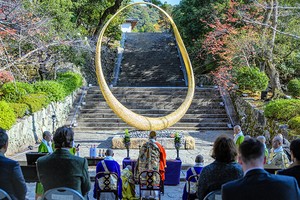By EMIKO ARIMOTO/ Staff Writer
December 26, 2022 at 07:00 JST
IRUMA, Saitama Prefecture--Shipping Japanese green tea to India, one of the world’s top tea drinking nations and a major exporter of Assam and Darjeeling tea, would seem on the face of it to make little sense.
Yet, Ryutaro Matoba, who grows Sayama tea here, reckons he has found the perfect formula to appeal to the vast market that the subcontinent offers.
Matoba, 41, credits his good fortune to Abhishek Gupta, 26, a student from India who advised him to flavor his leaves with cinnamon and fennel seeds, spices popular in his home country. The latter is used as a mouth refresher in India.
The pair will get things rolling next month by selling the first batch of products to Japanese consumers and Indian nationals living in Japan with the aim of eventually making Japanese green tea available in India.

Matoba befriended Gupta, who studies environmental sciences at the University of Tokyo’s Graduate School of Arts and Sciences, through a socializing event in January.
The session was organized by Hisato Tsuboi and Toyofumi Suzuki for Matoba, their mutual acquaintance, who is promoting the charms of Sayama tea to the world.
Tsuboi, 36, and Suzuki, 39, are representatives of Yomoyama Inc., which supports companies seeking to crack open overseas markets and also assists foreign students studying in Japan.
Seven students from six countries, including Brazil, Turkey and Malaysia, attended the event. They were studying at the University of Tokyo, Nagoya University, Meiji University and other institutions.
While they talked with Matoba online and visited his plantation, the students shared ideas to make Sayama tea popular in their home countries.
Gupta’s proposal to export tea tailored to local tastes to India won the most support from the participants. A crowdfunding campaign raised more than 600,000 yen ($4,527) for the project, exceeding the goal of 500,000 yen.
Gupta came to Japan seven years ago, and he was struck by the health properties of Japanese green tea.
Chai, a type of milk tea containing heaps of sugar, is consumed across India.
He imagined Japanese green tea could prove popular in his home country if it was flavored with spices the Indians like.
Gupta and Matoba got to work on developing products.
Matoba selected tea varieties based on Gupta’s idea to add cinnamon and fennel seeds.
Seeking advice from other foreign students, the two made blending attempts to make tea easy to drink for people overseas.
Two products got their seal of approval in November. One is cinnamon-flavored “hoji-cha” roasted tea and the other is green tea blended with fennel seeds.
“The flavors are interesting. Both Japanese and foreign nationals can enjoy them,” Matoba said. “We will keep making improvements to create a blend of tea that will be cherished for a long time.”
Gupta said the finished products are easy to drink for Indians although he had a hard time coming up with ideas. He added that he wants his family and friends to drink them.




















A peek through the music industry’s curtain at the producers who harnessed social media to help their idols go global.
A series based on diplomatic documents declassified by Japan’s Foreign Ministry
Here is a collection of first-hand accounts by “hibakusha” atomic bomb survivors.
Cooking experts, chefs and others involved in the field of food introduce their special recipes intertwined with their paths in life.
A series about Japanese-Americans and their memories of World War II